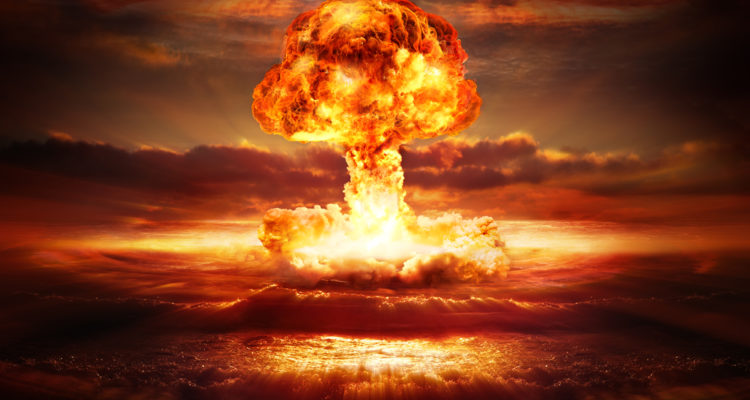The United Nations needs to break its silence and, before it is too late, take seriously Iran’s latest rapid nuclear escalation.
By Majid Rafizadeh, The Gatestone Institute
While many governments around the world are focusing on how to halt the spread of the COVID-19 virus, the Iranian regime appears to be concentrating on another issue: rapidly advancing its nuclear program.
Amid the coronavirus, Iran has crossed a major threshold concerning its nuclear plans. The United Nations’ atomic watchdog, the International Atomic Energy Agency (IAEA), reported that Tehran has increased its enriched uranium stockpile, which now stands at the equivalent of 1,510 kg. Iran is allowed to possess 300 kg of low enriched uranium — a substantial increase in Iran’s enriched uranium stockpile in a short period of time.
Why should having this amount of enriched uranium be regarded as a critical issue? Because the Iranian regime now has enough enriched uranium to refine and build a nuclear bomb if it desires to do so. Approximately 1000kg of uranium enriched at just 5% can be refined to create one nuclear bomb.
Moreover, “the agency identified a number of questions related to possible undeclared nuclear material and nuclear-related activities at three locations in Iran,” according to a recently published second report by the IAEA.
It is important to point out that the three undeclared nuclear locations to which the IAEA is referring are in addition to another, fourth, clandestine nuclear site in Iran that was first revealed by Israel. In a November 2018 speech to the UN General Assembly, Israeli Prime Minister Benjamin Netanyahu stated that Iran had a “secret atomic warehouse for storing massive amounts of equipment and material from Iran’s secret nuclear weapons program.”
At the same time, two non-partisan organizations based in Washington, DC — the Institute for Science and International Security (ISIS) and the Foundation for the Defense of Democracies (FDD) — released detailed reports about Iran’s undeclared clandestine nuclear facilities as well.
Although Iranian leaders claimed that the nuclear warehouse was a carpet cleaning facility, traces of radioactive uranium were detected at the site; Israel’s warning and other reports have proved accurate.
The Director General of the IAEA, Rafael Grossi, admitted, as reported on March 3, 2020:
“The fact that we found traces (of uranium) is very important. That means there is the possibility of nuclear activities and material that are not under international supervision and about which we know not the origin or the intent.”
“Iran must decide to cooperate in a clearer manner with the agency to give the necessary clarifications,” Grossi told journalists, when he was meeting with French President Emmanuel Macron on March 3, 2020.
Although Iran is a party to the Non-Proliferation Treaty (NPT), it is refusing to allow the IAEA to inspect its nuclear sites. The IAEA is also not allowed to inspect or monitor Iran’s military sites, where nuclear activities are most likely being carried out.
Among the many concessions that the Obama administration granted to the Iranian government was accepting the Iranian leaders’ demand that military sites would be out of the IAEA’s reach. Because of this surrender, at various high-profile sites such as the Parchin military complex, located southeast of Tehran, the regime has been free to engage in nuclear activities without any risk of inspection.
Iran is also breaching several UN resolutions by not allowing the IAEA to inspect its nuclear sites. The March 12, 2020 Congressional Research Service report on Iran’s Nuclear Program stated:
“Several U.N. Security Council resolutions adopted between 2006 and 2010 required Iran to cooperate fully with the International Atomic Energy Agency’s (IAEA’s) investigation of its nuclear activities, suspend its uranium enrichment program, suspend its construction of a heavy-water reactor and related projects, and ratify the Additional Protocol to its IAEA safeguards agreement. Iran did not comply with most of the resolutions’ provisions.”
Iran’s leaders keep professing that their nuclear activities are solely for peaceful purposes; inconveniently for them, however, plutonium is not needed for peaceful nuclear energy.
Iranian Foreign Minister Mohammad Javad Zarif claimed on March 4, 2020, “We have always said we are not interested in building nuclear weapons.” If the Iranian government is advancing its nuclear program for peaceful purposes, why has Tehran repeatedly failed to report its nuclear facilities, including those at Natanz and Arak, to the IAEA? Also, why does the Iranian government keep refusing to answer the IAEA’s questions regarding its secret nuclear facilities?
The United Nations needs to break its silence and, before it is too late, take seriously Iran’s latest rapid nuclear escalation.
Dr. Majid Rafizadeh is a business strategist and advisor, Harvard-educated scholar, political scientist, board member of Harvard International Review, and president of the International American Council on the Middle East. He has authored several books on Islam and US foreign policy. He can be reached at Dr.Rafizadeh@Post.Harvard.Edu





